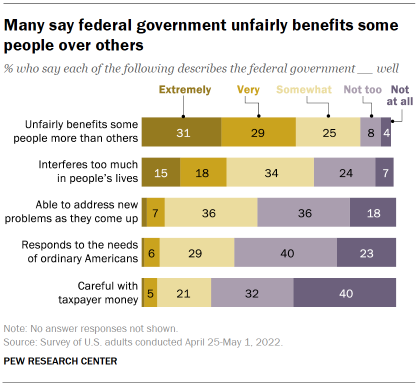
Asked about some descriptions of the federal government, relatively small shares of Americans say they think of the federal government as responsive to the needs of ordinary Americans, being careful with taxpayer money, or being able to address new problems as they come up. No more than one-in-ten say each of these phrases describe the federal government very or extremely well, and less than half say they describe the federal government even “somewhat” well. Majorities say these are not too, or not at all, good descriptors of the federal government.
By comparison, about six-in-ten Americans say the phrase “unfairly benefits some people more than others” describes the federal government extremely well (31%) or very well (29%), and another quarter say it describes the government somewhat well.
The public’s views are more mixed when it comes to whether the government “interferes too much in people’s lives.” A third say that this phrase describes the federal government extremely (15%) or very well (18%); 34% say it describes the government somewhat well, while about three-in-ten say it describes the government not too (24%) or not at all (7%) well.
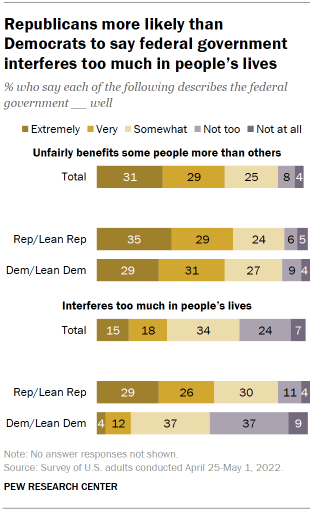
There are only modest partisan differences in views of whether the federal government unfairly benefits some people more than others. Republicans and independents who lean toward the Republican Party are somewhat more likely than Democrats and Democratic leaners to say this phrase describes the government extremely well (35% vs. 29%), but about six-in-ten in both partisan groups say it describes the federal government very or extremely well. Only about one-in-ten in either party say it is not too or not at all a good descriptor of the federal government.
The partisan divide is much larger on the question of whether government “interferes too much in people’s lives.” A majority of Republicans (55%) say this phrase describes the federal government very or extremely well, compared with 17% of Democrats. And about half of Democrats (53%) say this describes the government at least somewhat well, while 84% of Republicans say the same.
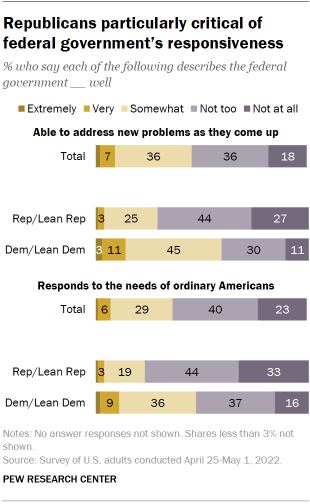
Sizable shares in both parties express doubts about the federal government’s ability to address new problems as they arise, as well as its responsiveness to the needs of ordinary Americans. Though these doubts are more widespread among Republicans than Democrats.
Seven-in-ten Republicans and 41% of Democrats say the phrase “able to address new problems as they come up” describes the federal government not too or not at all well, while just 13% of Democrats and 4% of Republicans say it describes the government very or extremely well. Nearly half of Democrats (45%) and a quarter of Republicans say this describes the federal government somewhat well.
A similar pattern is evident in views of whether the statement “responds to the needs of ordinary Americans” describes the federal government well. Roughly three-quarters of Republicans (76%) and 53% of Democrats say it does not, and only about one-in-ten Democrats (11%) and just 4% of Republicans say it describes the federal government very or extremely well. About a third of Democrats (36%) and 19% of Republicans say this describes the government somewhat well.
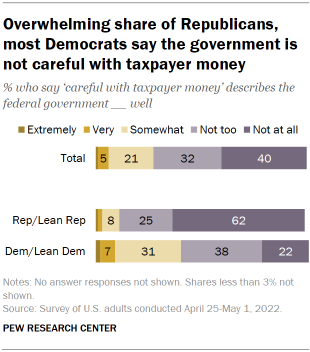
Fewer than half in either party express much confidence in the way the federal government spends money, though Republicans are particularly likely to be critical of the federal government’s handling of taxpayer dollars.
About nine-in-ten Republicans say that the phrase “careful with taxpayer money” does not describe the government well, including 62% who say it describes the government not at all well. Among Democrats, six-in-ten say this phrase describes the federal government not too (38%) or not at all well (22%). While 8% of Republicans and 31% of Democrats say this describes the federal government somewhat well, no more than one-in-ten in either party say that this phrase describes the government extremely or very well (3% of Republicans, 9% of Democrats).
Public views of the challenges government faces
While the public is dissatisfied with some aspects of the federal government’s performance, many Americans also view the job of government as harder than it was in the past. About half of adults (49%) say the statement “the problems facing the federal government are more difficult than they were a few decades ago” describes their views very or extremely well, while just 18% say it does not describe their views; 32% say it describes their views somewhat well.
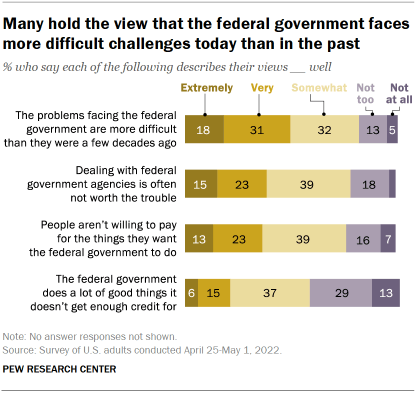
On balance, more Americans say “people aren’t willing to pay for the things they want the federal government to do” describes their own views extremely or very well (36%) than say it does not (23%). About four-in-ten (39%) say this describes their views somewhat well.
In contrast, just 21% of Americans say the statement “the federal government does a lot of good things it doesn’t get enough credit for” describes their views very or extremely well, while nearly twice as many say this describes their views not too or not at all well (41%). About four-in-ten (37%) say it describes their views somewhat well.
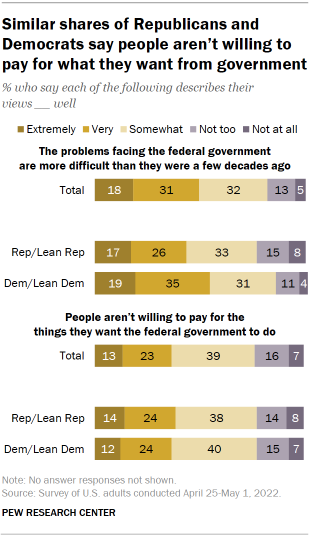
Democrats are somewhat more likely than Republicans to say that the problems facing the federal government are more difficult today than in the past. A majority of Democrats (54%) say the statement “the problems facing the federal government are more difficult than they were a few decades ago” describes their views very or extremely well, compared with 43% of Republicans.
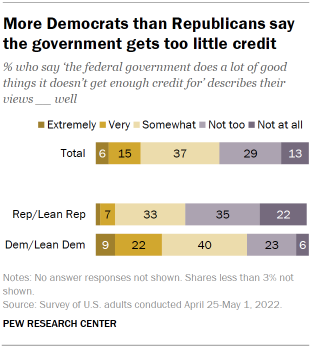
There are no significant partisan differences on the question of whether people are willing to pay for what they want the federal government to do. Similar shares of Republicans (38%) and Democrats (36%) say the statement “people aren’t willing to pay for the things they want the federal government to do” describes their views very well or extremely well.
Partisan differences are larger when it comes to whether the government deserves more credit than it gets. About three-in-ten Democrats (31%) say the statement “the federal government does a lot of good things it doesn’t get enough credit for” describes their views extremely or very well, while an additional 40% say this describes their views somewhat well. By comparison, nearly six-in-ten Republicans (57%) say this statement describes their views not too or not at all well.
Nearly four-in-ten (38%) say that the statement “dealing with federal government agencies is often not worth the trouble” describes their views very or extremely well, and a similar share (39%) say this describes their views somewhat well. Just 22% say this describes their views not too or not at all well.
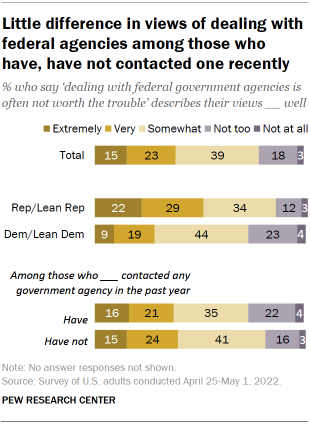
While large shares in both parties express at least somewhat negative views about dealing with government agencies, Republicans are more likely than Democrats to say that this statement describes their views very or extremely well. Half of Republicans say this, compared with 28% of Democrats; 84% of Republicans and 72% of Democrats say it describes their views at least somewhat well.
There are only modest differences in these views between the 31% of Americans who have contacted a government agency over the last year and the 68% who have not.
Personal freedoms and the federal government
Just over half of Americans (54%) say the federal government does a great deal (11%) or a fair amount (44%) to protect people’s personal freedoms, while 35% say the government protects people’s freedoms “not too much” and one-in-ten say the federal government does not at all protect people’s personal freedoms.
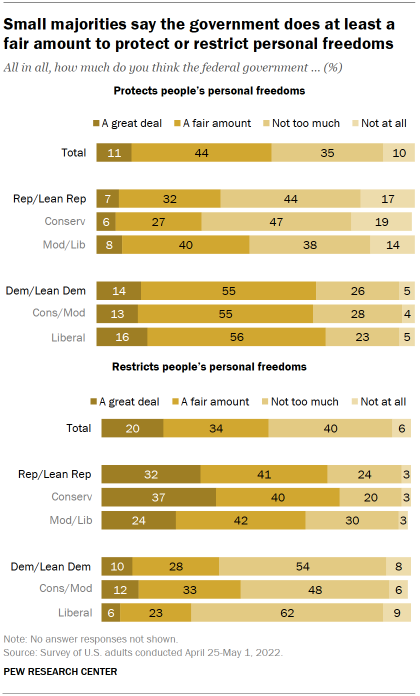
Overall, the public holds similar views on whether the federal government restricts people’s personal freedoms: 54% say the government restricts people’s freedoms a great deal (20%) or a fair amount (34%), while 40% say the government does not do much to restrict people’s freedoms and just 6% say the federal government does not at all restrict people’s freedom.
Democrats are more likely than Republicans to say the federal government works to protects people’s personal freedoms. About seven-in-ten Democrats (69%) say the federal government does at least a fair amount to protect people’s freedoms. By contrast, 39% of Republicans say this.
Among Republicans, about half of moderate and liberal Republicans (48%) say the federal government does at least a fair amount to protect rights and freedoms. Conservative Republicans (34%) are considerably less likely to say this. There are no ideological differences among Democrats on how much the federal government does to protects people’s rights.
Republicans are much more likely to see the federal government as restricting people’s freedoms: Nearly three-quarters say the government does at least a fair amount to restrict people’s personal freedoms, including 32% who say it does a great deal to restrict people’s freedoms. Still, conservative Republicans (77%) are more likely than moderate and liberal Republicans (66%) to hold this view.
Most Democrats do not see the federal government as restricting people’s freedoms: 62% say the federal government does not do much or anything at all to restrict people’s personal freedoms, while 38% of Democrats say the government does at least a fair amount to restrict these freedoms. Conservative and moderate Democrats are more likely than liberal Democrats to say the federal government restricts personal freedoms (45% vs. 29%).
Beyond ideological divisions, there are only modest demographic differences among Republicans in views of how the government affects people’s rights and freedoms. Across most demographic groups, about seven-in-ten Republicans say the government does at least a fair amount to restrict personal freedoms, while about four-in-ten say the government protects people’s freedoms. However, there is more variation in these views among Democrats.
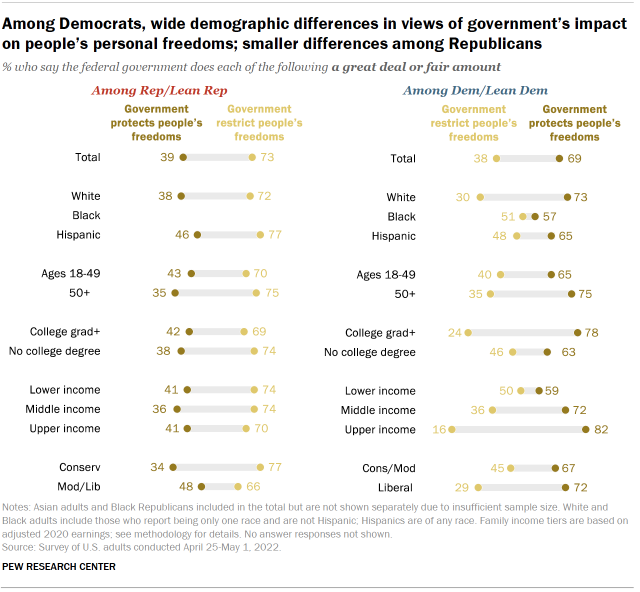
While 57% of Black Democrats, for example, say the federal government does at least a fair amount to protect personal freedoms, only a slightly smaller share (51%) say the federal government does a lot to restrict freedoms. By comparison, White Democrats are more than twice as likely to say the federal government does a fair amount to protect people’s freedoms (73%) than to say it does a fair amount to restrict people’s personal freedoms (30%). And while 65% of Hispanic Democrats say the government protects people’s freedoms, 48% say the government restricts personal freedom.
Democrats with a college degree or more education are far more likely to say the federal government protects people’s personal freedoms than to say it restricts them (78% vs. 24%). Among Democrats who have less formal education, there is a much narrower gap in the shares holding these two views (63% vs. 46%).
There are also wide differences in perceptions of the federal government supporting or hindering personal freedoms by household income among Democrats. Those with lower household incomes are just slightly more likely to say the government does a fair amount to protect personal freedoms (59%) than to say it does a fair amount to restrict freedoms (50%). Middle-income Democrats are twice as likely to say the government protects personal freedoms (72%) than to say it restricts personal freedoms (36%). Among upper-income Democrats, fully 82% say the government protects personal freedoms, while just 16% say the government restricts personal freedoms.
Large shares in both parties say the government intentionally withholds information
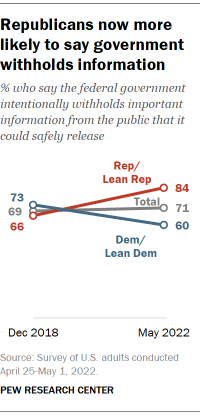
About seven-in-ten Americans (71%) say that the federal government intentionally withholds important information from the public that it could safely release, while 28% say the federal government publicly releases the important information it can safely release.
Among the overall public, these views are little changed from 2018. But over this time period, Republicans have become more likely to say that the government intentionally withholds information, while Democrats have become less likely to say this. Today, more than eight-in-ten Republicans (84%) say that the government intentionally withholds information, up from 66% who said this in December 2018. And 60% of Democrats now say this, down from 73%.
Younger Democrats are more likely than older Democrats to say that the federal government intentionally withholds important information from the public that it could safely release.
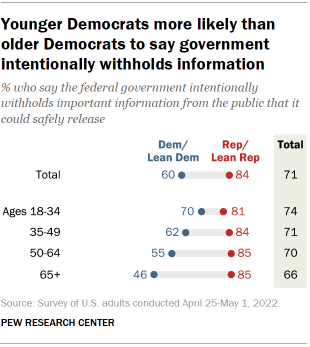
Seven-in-ten Democrats ages 18 to 34 say that the government does withhold important information, while 29% say the federal government publicly releases the information it can safely release.
Roughly six-in-ten Democrats ages 35 to 49 (62%) say the government withholds information, as do 55% of Democrats ages 50 to 64. Democrats ages 65 and older are more closely divided: About half (52%) say the government does release the information it can safely release, while a similar share (46%) say the government intentionally withholds important information.
Republicans’ views on whether the federal government intentionally withholds important information that it could safely release are nearly identical across age groups: At least eight-in-ten say the government withholds information among Republicans ages 18 to 34 (81%), 35 to 49 (84%), 50 to 64 (85%) and 65 and older (85%).




